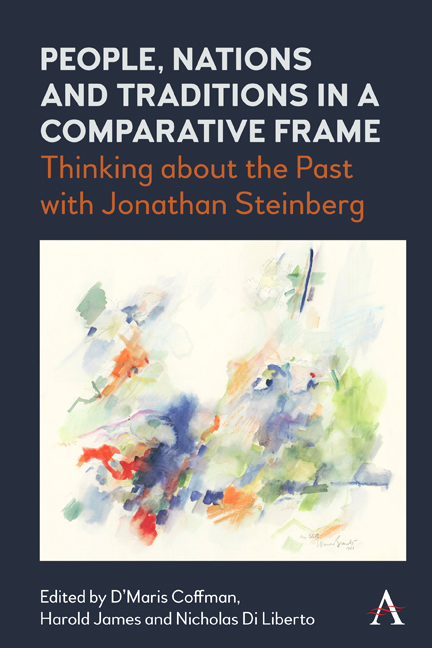 People, Nations and Traditions in a Comparative Frame
People, Nations and Traditions in a Comparative Frame Book contents
- Frontmatter
- Contents
- Foreword
- Acknowledgements
- Notes on Contributors
- Introduction
- Part One Methodological Pluralism and New Applications
- Part Two Personal and National Character
- Part Three Society, Families and the Sovereign Self
- Part Four History Out of Sync: Modernity and Tradition
- Part Five History, Narrative and the Human Condition
- Afterword
- Bibliography of Jonathan Steinberg’s Works
- Index
Foreword
Published online by Cambridge University Press: 23 February 2022
- Frontmatter
- Contents
- Foreword
- Acknowledgements
- Notes on Contributors
- Introduction
- Part One Methodological Pluralism and New Applications
- Part Two Personal and National Character
- Part Three Society, Families and the Sovereign Self
- Part Four History Out of Sync: Modernity and Tradition
- Part Five History, Narrative and the Human Condition
- Afterword
- Bibliography of Jonathan Steinberg’s Works
- Index
Summary
I knew of Jonathan long before I met him. His father, Rabbi Milton Steinberg, a political liberal and rabbinical reformer, was much admired by my parents who found him to be a breath of fresh air in the complex religious and political environment of pre-1939 New York City. When I came to Cambridge, I knew Jonathan was a member of that talented group of PhD students taught by Harry Hinsley, before the latter gained eminence as the author of the multivolume study on British intelligence during the Second World War. Though never a member of that circle, and always an outsider as its members were appointed to university posts, I knew of Jonathan's work on Tirpitz, a ground breaking study of the pre-war German navy, which fed my own research. When I joined New Hall, I heard from my students of this brilliant lecturer and engaging supervisor, who took an active interest in his students, even those not at Trinity Hall. When I started to supervise an increasing number of foreign PhD students, mainly, though not exclusively, from the United States and Germany, I found that Trinity Hall was a favourite choice of college, for Jonathan was not only accessible but a source of special assistance and support to those who found Cambridge a perplexing environment to say the least. After I finally met him and we subsequently became friends, I found his book Why Switzerland? an insightful introduction to that onion-like country where my husband was teaching. I learned much, too, from his comparative study of Germany and Italy and was heavily dependent on his bibliographies when the study of the Holocaust became an important part of the Modern European History paper. Having spent some years before coming to Cambridge working in the city (for a time at S. G. Warburg & Co, the London-based investment house), Jonathan's interest and grasp of economic history and theory was always more than purely academic. It informed his treatment of the Deutsche Bank, a highly contentious subject, which Jonathan handled in an authoritative and exceedingly well-balanced way. This background, as well as his wide reading in the field, has provided a solid base for his recent teaching at the University of Pennsylvania.
- Type
- Chapter
- Information
- People, Nations and Traditions in a Comparative FrameThinking about the Past with Jonathan Steinberg, pp. vii - viiiPublisher: Anthem PressPrint publication year: 2021


